Being read to is a pleasure that most people will not experience after childhood. My father was an excellent reader. He did all the voices and never shied from long books (I’ve only ever “read” The Lord of the Rings trilogy with my dad pronouncing every word). Everyone should be read to as a child. But when was the last time you shared this joy with an adult?
Why My Husband is Reading to Me
My husband and I both love books even though we read at very different speeds. And with my terrible memory, by the time he gets around to reading something I loved, I’ve forgotten the best parts.
After buying the first book of Guillermo del Toro and Chuck Hogan’s The Strain for his Kindle, my husband fell in love with the book. The thing about the Kindle is that until I get one, I can’t read the book unless I steal his. And I’m still really devoted to paper books. When he offered to read the book aloud to me, I was gobsmacked and grateful.
We’ve spent subsequent evenings in the living room (that’s what we call the room without the TV, even though we hardly live in it) as he reads eagerly on. He’s pre-reading the book because he can’t contain his excitement, but also because it’s difficult to do a cold reading aloud. Some nights he reads to me when we get home and again after dinner. One night he read straight through for almost two hours until he was hoarse and I made him stop.
I am loving the attention and the time together. I’m loving our discussions before, during, and after.
How Being Read to is Affecting My Writing
Being read to is changing my relationship with language. I look at words day and night. I read. I edit. I write. I move commas and think about substituting words. I dread an especially long paragraph in a dull book and count pages until the end. I sneak peeks of endings.
I can’t do any of these things when my husband is reading to me. Instead, I watch his mouth forming the words and I encounter the words in a space where I can’t see them. I see the pictures the words are drawing (I’m sure Derrida or Foucault would have a more intelligent way of describing this). Having him read to me is helping me engage with the story (and especially the imagery) in a different way.
When it comes down to writing, I feel freer. I can focus more on what the words are supposed to do than on what they are. I know that I remember the trail of biological matter swept across the inside of that plane rather than any of the words that were specifically used. As a writer, words are my tools and they are important, but I feel like sometimes I oil and polish my screwdrivers without ever actually putting them to proper use.
The Problem with Books on Tape
The one way that many adults still experience being read to is through books on tape. My husband and I have shared the joy of being read to during road trips. We’ve listened to mysteries and classics from readers good and poor. Listening to The Lord of the Rings while crossing Utah even changed the geography I associate with the books.
Books on tape are a great way to experience a book when you are doing something else. Except that we are always doing something else. They work for me on road trips because there is the meditative quality of driving. But I can’t imagine listening to one in traffic. And when I’ve tried listening to books while gardening, my mind is equally split between the two tasks.
The problem with books on tape is a problem with the listener (me). In this busy, busy life, it’s hard to imagine allowing myself to sit still and focus on the story when I know my hands could be doing something else. When my husband reads to me, I can appreciate the gift of energy he’s putting into storytelling. I try to repay him with the gift of attention.
Reading to My Husband
I may have started this whole reading aloud thing last summer. We were waiting in a backyard hammock for a meteor shower and I was as restless as usual. I went inside and grabbed The Arabian Nights and started reading him stories. We haven’t gotten very far in the months since, but I hope soon to return the reading favor.
What I Want for You
When my husband started reading aloud to me, I justified the guilty pleasure with thoughts of all the readers Jorge Luis Borges must have listened to after he went blind. I wondered if that was part of the genius of his writing. But there should be no guilt in sharing a story and I’m eagerly awaiting my next chapter.
Here’s your homework. Ask someone to read to you. Or read to someone else. You don’t have to start with a full novel—a short story or poem will do. If you have kids, read to them but also try this with an adult. Recapture the magic of oral story telling. Reencounter language in its many forms. Relate to another person by share the special gifts of attention, time, and story. I hope reading aloud will bring you as much pleasure as it’s brought us.
If this review made you want to read the book aloud, pick up a copy of The Strain from Bookshop.org. Your purchase keeps indie booksellers in business and I receive a commission.
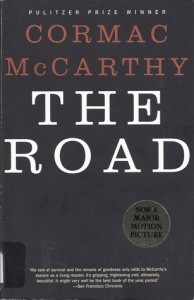 The first time I picked up The Road by Cormac McCarthy, I read it almost straight through, and I was devastated by the bleakness of the post-apocalyptic world. The second time I read it, I leafed through its pages to see if I could find hope among the ashes.
The first time I picked up The Road by Cormac McCarthy, I read it almost straight through, and I was devastated by the bleakness of the post-apocalyptic world. The second time I read it, I leafed through its pages to see if I could find hope among the ashes.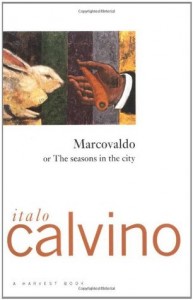 I sought out Italo Calvino this morning because I wanted to learn how he creates fairytales that seem to exist very close to reality. In the fourth story of Marcovaldo, “Winter, The City Lost in the Snow,” I found what I was looking for.
I sought out Italo Calvino this morning because I wanted to learn how he creates fairytales that seem to exist very close to reality. In the fourth story of Marcovaldo, “Winter, The City Lost in the Snow,” I found what I was looking for.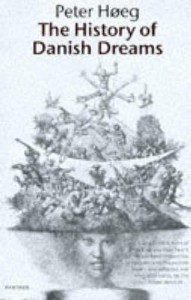 As the title implies, The History of Danish Dreams is dreamlike. Even more so for readers like me who have a poor knowledge of Danish history. Peter Høeg does a masterful job of hovering in the space between fable and fact where story and truth lie and though I am curious about whether there is an underlying structure of verifiable events, I will not look them up because I don’t want the spell to be broken.
As the title implies, The History of Danish Dreams is dreamlike. Even more so for readers like me who have a poor knowledge of Danish history. Peter Høeg does a masterful job of hovering in the space between fable and fact where story and truth lie and though I am curious about whether there is an underlying structure of verifiable events, I will not look them up because I don’t want the spell to be broken.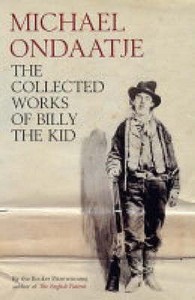 Reading The Collected Works of Billy the Kid, I was struck by Michael Ondaatje’s inclusion of photographs with the text. The text itself was an interesting patchwork of poetry and prose and I can see that Ondaatje was using visual matter as another layer of that patchwork.
Reading The Collected Works of Billy the Kid, I was struck by Michael Ondaatje’s inclusion of photographs with the text. The text itself was an interesting patchwork of poetry and prose and I can see that Ondaatje was using visual matter as another layer of that patchwork.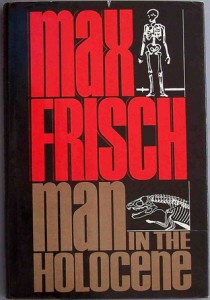 It is important that extraneous material incorporated into a text become an organic and necessary part of the whole. Man in the Holocene by Max Frisch uses scraps of encyclopedia entries as part of the narrative. These scraps are seamlessly integrated into the narrative because Geiser is clipping things that matter to him from his books and pasting them to his walls as he is slowly losing his memory. For example, one of the scraps is a definition, “Weakness of memory is the deterioration of the faculty of recalling earlier experiences.”
It is important that extraneous material incorporated into a text become an organic and necessary part of the whole. Man in the Holocene by Max Frisch uses scraps of encyclopedia entries as part of the narrative. These scraps are seamlessly integrated into the narrative because Geiser is clipping things that matter to him from his books and pasting them to his walls as he is slowly losing his memory. For example, one of the scraps is a definition, “Weakness of memory is the deterioration of the faculty of recalling earlier experiences.”